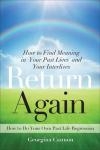
In this vein, Georgina Cannon has produced an account of the general thinking that underpins the assumptions of such reincarnation therapy, of which she is a practitioner and teacher. She does not present any scientific support for the claim that we are subject to cycles of rebirth, so the sceptical reader requiring evidence will not be satisfied. For her, though, the validity of the recall of a past life is subsidiary to what is learned, so it is unimportant if the life cannot be verified, or even whether it occurred in the way it is remembered. Rather, the book deals with past lives (and ‘interlives’), as they can be used to assist us in the present, learning lessons from experiences of which we might not be conscious, but which have consequences for how we live our lives now. Cannon aims to help us understand the effects of karma across incarnations, to integrate past and present influences in order to improve our current lives, and carry that understanding into future ones.
The interlife (Bardo) is a concept less familiar in the West than that of rebirth. As the name suggests, it concerns the passage between two lives, and it is significant as a learning opportunity because it operates at the level of spirit. The individual does not progress alone at this time. Rather, it is a social activity, involving a soul circle of individuals who are associated through incarnations, and of course soul mates. These all contribute in order to help individuals assess their progress, and decide what they should do to maximise the personal value of these multiple existences. Cannon stresses the importance of meditation, as it allows us to see the interconnectedness of the universe and our place in it as we pursue our “soul journey”.
While she suggests that the regression process is enhanced by seeking the assistance of an experienced facilitator, she does say that worthwhile results can be obtained by undertaking a programme on an individual basis. Nor do you need to be of a spiritual nature to gain from the effort. Whatever your perspective, Cannon argues, you will deepen your self-knowledge through using the induction techniques she describes, and be able to think more clearly about your purpose in this life, and in those to come.

